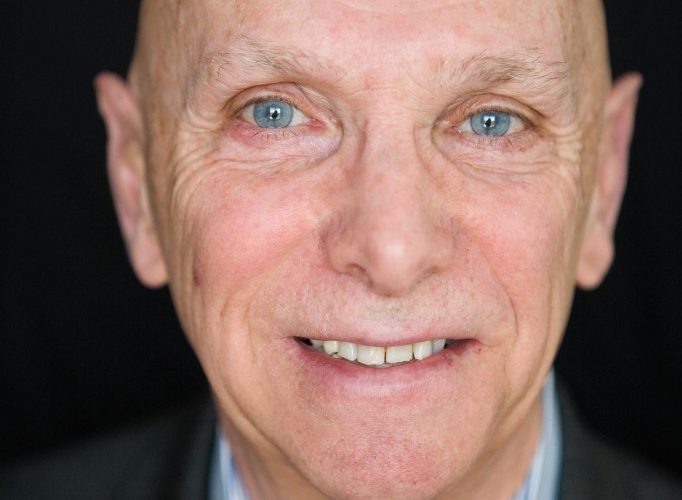At Just Imagine Hypnosis Center, hypnotist Don Glass helps clients change unproductive behaviors-overeating, smoking, phobias, and more-just by altering the way they think. By Debbie Strong
Linda Ready had been struggling for years with her weight when, last spring, her husband came home from his Lowell Lions Club meeting and described a presentation given that night by an area hypnotist, Don Glass, who used hypnotherapy to help clients lose weight-and keep it off.
Ready was fascinated by the remarkable success rate Glass reported, so she contacted him and quickly signed on to a four-session round of his newest treatment option, the Virtual Gastric Band (VGB) program, during which the client is convinced through hypnosis to believe that she has undergone gastric band surgery. While hypnotized, clients are guided through all aspects of surgery: entering the hospital, meeting with the surgeon and anesthetist, and experiencing the actual surgery-operating room smells, machines beeping, etc.-and post-op care. When they emerge, patients truly believe they’ve had the surgery and automatically begin to eat less, dropping pounds naturally and without feeling hungry.
Sound a little far-fetched? It works, Glass says, because a person’s subconscious mind-the part of the mind used when you’re daydreaming-is trained to accept new suggestions or to retrain old bad habits that may have become ingrained behaviors in early childhood. “The subconscious mind cannot tell the difference between what is real and what is imagined,” he says. Glass doesn’t put clients to sleep or use the cliched swinging pendulum, either; he simply guides clients to an ultra-relaxed, hyper-focused state and suggests new, healthier habits. “When a client is in a relaxed state of hypnosis, they become acutely aware-you could be 300 to 400 times more aware than normal-and are very receptive to positive suggestions.”
About 75 percent of his clients come for help with smoking (a two-session, $269 experience with a 90 percent success rate) or weight loss (either an eight-session program for $2,200 or a four-session program for $800), but people also come to him for help reducing stress, battling addictions or depression, alleviating phobias, memory or sports performance enhancement, and more. Glass has seen such positive results with his work that all prices include a 100 percent lifetime guarantee; clients can return for a free session if their problems ever return. He stresses that the one crucial ingredient for success is that the person truly wants to change and is not held back by fears or apprehensions. That’s why every client’s hypnosis experience begins with an initial, rapport-building “intake” session, during which Glass and the client get to know each other, discuss the client’s goals and fears, and determine together if hypnosis is the right option.
As for Ready, she began the VGB program in May, and after four sessions with Glass, about one month later, had dropped 25 pounds from her frame. Now, almost a year later, she has kept the weight off. “I felt the band right away,” says Ready, who says her doctor was “blown away” when she went for an appointment and revealed her new body. “I began to feel full after half a sandwich or hamburger; I truthfully did not want to eat any more.” Since dropping the weight, Ready’s health has improved and she enjoys a more energized, active lifestyle. “It was the best thing I ever did for myself.”
Just who is this miracle worker who helped a perfectly sane adult believe she had undergone bariatric surgery with just the power of his voice? Glass is an affable, energetic man who found his way to hypnosis after losing his wife-a selfless woman whose life was all about helping others–to cancer in 2010. “But self-hypnosis, or meditation, is something I had been using my whole life,” to cope with stressful situations and the attention deficit disorder he dealt with as a young man, Glass says. Since 2010, he’s been treating clients from all over the Merrimack Valley at offices in both Dracut and Andover. He received his official training from the National Guild of Hypnotists, a 62-year-old organization that trains and certifies hypnotists from around the world and has about 10,000 members to date. Glass also volunteers his hypnotherapy services to help at-risk children from broken homes or in other challenging situations, and he plans to start a hypnosis-based ADD or ADHD support group down the line.
Glass recently began meeting with clients at a third location in Billerica, renting office space from Sandy Chapnick and Honi Kawut, who run Billerica Chiropractic Office. “Don has a very calming presence,” says Chapnick, “and such an impressive, great grasp of his profession.” Beyond their cheerful personalities, he and Glass share a passion for their respective crafts and an overwhelming desire to help others. They’ve even begun referring patients to one another, finding that hypnotherapy and chiropractic therapy are “the perfect marriage,” says Chapnick. “We have a common goal of helping people feel better and lead healthier, more fulfilling lives.”
If hypnosis works so well and is so relatively affordable and low-risk, then why aren’t clients all over the country lining up to try it? “Younger people are more inclined to accept hypnosis, because they’re seeing the results” says Glass, who, when he’s not helping clients, enjoys an active lifestyle of road cycling, indoor rowing, and healthy cooking. “That’s opposed to older folks, who have allowed themselves to be conditioned by Hollywood and TV versions [of hypnosis].”
As resistant as society has been in the past, Glass says he’s noticed that the tide is beginning to change toward hypnosis. “I think the masses are beginning to line up. Not at the rate I’d like to see, but it’s happening-and more importantly, the rate of acceptance is growing.” ?n

